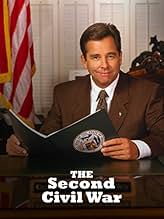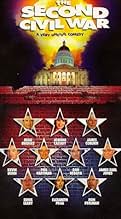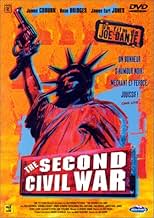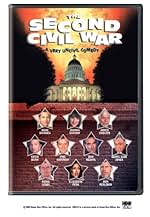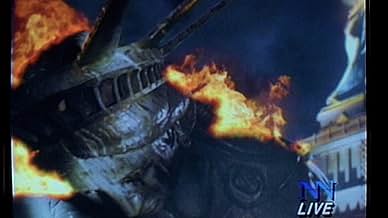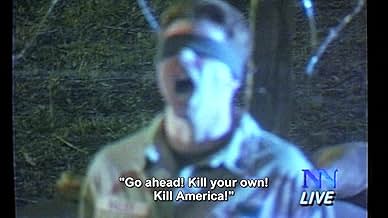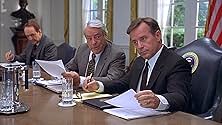IMDb-BEWERTUNG
6,6/10
2467
IHRE BEWERTUNG
Füge eine Handlung in deiner Sprache hinzuA simple immigration issue spins wildly out of control for those involved, ranging from the President of the United States, to a news producer.A simple immigration issue spins wildly out of control for those involved, ranging from the President of the United States, to a news producer.A simple immigration issue spins wildly out of control for those involved, ranging from the President of the United States, to a news producer.
- 1 Primetime Emmy gewonnen
- 2 Gewinne & 3 Nominierungen insgesamt
Empfohlene Bewertungen
"The Second American Civil War" appeared in the cinemas in Italy and caused many discussions probably because of the correspondences between its plot and the matter of secession in Northern Italy promoted by the Lega Nord party. Anyway, this movie is great for other reasons and deserved to be seen in the cinemas of any country. The only lack of the movie is the weakness of the characters such as the pathetic figure of the old wise journalist (James Earl Jones). However the real main character is the background, that is the society, the medias and the political class. Dante strikes all these categories with a brilliant and grotesque satire and represent all their contradictions.
The influential News Net spread idiotic and mediocre message. The politicians only care about keeping their careers with the political tricks (the ultimatum mustn't interfere with the popular soap-opera). Finally Dante paints a society that can't find an alternative between "We are all brothers" and "This is my land and here I command".
You MUST SEE it, if you have the chance because it is far the best movies of is genre (much better than "Wag the Dog")
The influential News Net spread idiotic and mediocre message. The politicians only care about keeping their careers with the political tricks (the ultimatum mustn't interfere with the popular soap-opera). Finally Dante paints a society that can't find an alternative between "We are all brothers" and "This is my land and here I command".
You MUST SEE it, if you have the chance because it is far the best movies of is genre (much better than "Wag the Dog")
Joe Dante's brilliant, stinging political satire The Second Civil War was awarded a pitifully limited cable release on HBO instead of the wide distribution it deserves, and I think that may have something to do with the fact that it hit a bit too close to home for some people with scarily accurate portrayal of the thoroughly idiotic state of mind that is present in every aspect of American politics. Come to think of it, the film was really prophetic when I think of how mangled things are in our neighbours disillusioned abode. Dante is a director who usually sticks to gooey fantasy/horror/comedy such as Gremlins or The Burbs, but here he ventures into the real world, without losing an ounce of his comic streak. There's trouble brewing stateside when renegade Idaho Governor Jim Farley (daft Beau Bridges) announces that he's closing his state's borders to immigrants, conveniently right at the time when Mexican refugees are scheduled to be brought in. This causes an uproar across the land as his immature antic catch the attention many different key players across the board. Ironically, he's shagging a sexy Mexican publicist (Elizabeth Pena, RIP) who is appalled with his behaviour. The frustrated US President (Phil Hartman) sends dapper 'fixer' Jack Buchan (James Coburn nails the darkly odd tone) who finds himself in over his head. Suddenly the Governor mobilizes troops to secure the state border, and schit gets real when the President retaliates by stationing forces of his own surrounding Idaho. The country seems to be on the brink of a ridiculous yet very plausible conflict of 'civil' proportions. Tension gets widespread when a hotshot New Network CEO (Dan Hedaya) and his drastic right hand man (Ron Perlman) send rogue report Denis Leary to cover the story. There's also additions to the unbelievably good cast from James Earl Jones, Roger Corman, Brian Keith, Johanna Cassidy, Dick Miller and more. The comedic tone abruptly shifts to deadly serious as actual violence erupts and we know that the film means business as our laughs go up in tank smoke as we get uncomfortable at the mirror being held. It's satire, it's fun but it's also a warning at the dangers of impulsive decision making and uneducated lunacy. At heart it's a comedy though, and a criminally overlooked one at that.
Phil Hartman is hilarious as the inept and waffling President, and Beau Bridges convincing as the Governor of Idaho, in this movie where mistakes and misread news pile up until a seemingly innocuous situation becomes a second civil war.
Phil Hartman brings some of the sarcastic wit from Newsradio into this telemovie. Some of the funniest moments are when he is actually debating with himself or others over what actions to take. Meanwhile the movie slowly progresses along the lines where not only is war imminent in the country, but war seems to be erupting everywhere between people - Congressmen, newsmen, et al...
Quite an engaging movie and the ending is one you would not want to miss as well, if just for that few seconds of riotous and comical misunderstanding.
Phil Hartman brings some of the sarcastic wit from Newsradio into this telemovie. Some of the funniest moments are when he is actually debating with himself or others over what actions to take. Meanwhile the movie slowly progresses along the lines where not only is war imminent in the country, but war seems to be erupting everywhere between people - Congressmen, newsmen, et al...
Quite an engaging movie and the ending is one you would not want to miss as well, if just for that few seconds of riotous and comical misunderstanding.
A funny, old-fashioned political farce set in an up-to-the-minute situation. An aggressive woman who heads an organization to "save the children" plans to move Pakistani orphans to Idaho. The governor of that state (Beau Bridges) decides to play to anti-immigrant sentiment by saying he will close the borders against further immigration.
The American President (Phil Hartman) is a simpleton who managed by his political adviser (James Coburn). They're only interested in re-election, and are perfectly willing to resort to civil war to make it happen.
A CNN-like news organization, "NN", which employs a rainbow of immigrants, and whose announcer is James Earl Jones, plays the potential conflict for all the advertising dollars it's worth.
The governor (Beau Bridges) is really much more interested in his affair with a Mexican American reporter for "NN", and she seems to be the only person aware of the irony.
The American President (Phil Hartman) is a simpleton who managed by his political adviser (James Coburn). They're only interested in re-election, and are perfectly willing to resort to civil war to make it happen.
A CNN-like news organization, "NN", which employs a rainbow of immigrants, and whose announcer is James Earl Jones, plays the potential conflict for all the advertising dollars it's worth.
The governor (Beau Bridges) is really much more interested in his affair with a Mexican American reporter for "NN", and she seems to be the only person aware of the irony.
So, I was most of the way through Joe Dante's filmography when I went through the overall list of everything he'd done again. He'd done a whole lot of television work, especially since the box office failure of Matinee, and it was a bit difficult to sort through stuff that could be pretty easily ignored (like C. S. I. Episodes) and other stuff that may or may not need attention. I settled on three things, the two Masters of Horror episodes Dante directed (mostly just because I had done the episodes that John Carpenter had directed), and this, The Second Civil War, an HBO movie he made just before Small Soldiers. Well, I mostly chose to do it for two reasons (as opposed to something like The Warlord: The Battle for the Galaxy, a television show pilot that didn't get picked up). The first was because it did get a limited theatrical release in Europe. The second was that Dante reportedly thought it was the best movie he'd ever made. Well, I couldn't just ignore that.
And what I found was a searing bit of omnidirectional political satire set in a future (though still 1998?) where America has spent at least a decade being overrun by immigrants and refugees from across the planet to the point where the governor of Rhode Island, Chinese by heritage, ends up calling for the end of immigration into America because it's changing the Chinese hybrid version of Rhode Island that he and his constituents call home.
The actual focus of the film's dramatic action is a standoff between the President of the United States (Phil Hartman, which should give you a clue about the tone of this film) and the governor of Idaho (Beau Bridges) after a nuclear blast in Pakistan displaces a large segment of the population and a charity is flying a planeload of children from Pakistan to Idaho as refugees. One of the smaller issues with the film is that the history of the wild, out of control immigration is only addressed in fits and starts, not coming up for about half an hour, actually, which may be the point and I'm wrong.
Anyway, the drive of the action comes from the NN newsroom run by Mel (Dan Hedaya) who talks about how their job is to put to trains on the same track and get them to crash. In a film where everyone comes out bad except a couple of characters, it's the media at large, especially those in charge, that comes out worst. They're manipulative, dishonest, and they do everything they possibly can to make sure that the train crash happens.
The comedy of the film is really consistent and often laugh out loud funny, digging in a knife into everyone in the film, from the person running the charity complaining about the cameraman (Dick Miller) using the wrong lens and dreaming of more donations to the governor being more concerned about his affair with a newscaster to the president needing to constantly find comparisons with previous presidents (the funniest being when he misunderstands the suggestion for FDR as Teddy Roosevelt).
The movement of the plot escalates in the standoff with the governor putting up roadblocks into the state with the National Guard, the army facing them down (a great little scene as two old generals insult each other mercilessly to their face while people watching on TV, unaware of what is being said, waxing poetic about the beautiful things they must be talking about), and a potential standdown that gets misunderstood leading to shooting. All of this is happening while no one really seems to care about it, the issue gets pushed aside constantly, and the governor unwittingly ends up collecting supporters from other states (like the aforementioned Chinese governor of Rhode Island).
There are also fairly isolated funny bits like the Hispanic mayor of Los Angeles giving a fiery speech in favor of the refugees, turning it into a call for repatriation of California into Mexico, and a race war breaking out because the African American parts of Los Angeles don't want it. Or, when James Earl Jones, the sage, older newsman who remembers when news was news (yeah, sure, I've seen Ace in the Hole), interviews a Congressman from Alabama who is a Sikh with this absurd Southern/Sikh accent combination.
I think Dante was skewering everyone here, and I wouldn't presume to use this to determine his own political outlook, but it really does feel like the anti-immigration side comes out better here. Yes, they're still skewered (there's a militia in Idaho that gets some satirical attention, in particular), but the actual plotline's winning moment is when the coalition of states forms and becomes public. I kind of get the sense that Dante really doesn't care that much about politics, and he was just out to skewer everyone, though.
And I think it works. I grate at the effort to make the "good" newsmen the heroes (Denis Leary plays the other) and the attempt at character-based pathos around the governor and his girlfriend (Elizabeth Pena), probably the film's actual dramatic and thematic point about combining cultures since she's Mexican and it's been a subplot through the whole thing about how she wants to break it off with him because of the whole immigration thing, but I also see the same sort of attitude here as I saw in Matinee, about leaving behind the troubles of the world to just live a little life away from it all.
It's really funny. It's got real satirical bite. It's omnidirectional in its scorn. It's got that anarchic spirit that Dante brought most obviously in Gremlins 2. This is a small gem in Dante's filmography, and I'm glad I didn't skip it.
And what I found was a searing bit of omnidirectional political satire set in a future (though still 1998?) where America has spent at least a decade being overrun by immigrants and refugees from across the planet to the point where the governor of Rhode Island, Chinese by heritage, ends up calling for the end of immigration into America because it's changing the Chinese hybrid version of Rhode Island that he and his constituents call home.
The actual focus of the film's dramatic action is a standoff between the President of the United States (Phil Hartman, which should give you a clue about the tone of this film) and the governor of Idaho (Beau Bridges) after a nuclear blast in Pakistan displaces a large segment of the population and a charity is flying a planeload of children from Pakistan to Idaho as refugees. One of the smaller issues with the film is that the history of the wild, out of control immigration is only addressed in fits and starts, not coming up for about half an hour, actually, which may be the point and I'm wrong.
Anyway, the drive of the action comes from the NN newsroom run by Mel (Dan Hedaya) who talks about how their job is to put to trains on the same track and get them to crash. In a film where everyone comes out bad except a couple of characters, it's the media at large, especially those in charge, that comes out worst. They're manipulative, dishonest, and they do everything they possibly can to make sure that the train crash happens.
The comedy of the film is really consistent and often laugh out loud funny, digging in a knife into everyone in the film, from the person running the charity complaining about the cameraman (Dick Miller) using the wrong lens and dreaming of more donations to the governor being more concerned about his affair with a newscaster to the president needing to constantly find comparisons with previous presidents (the funniest being when he misunderstands the suggestion for FDR as Teddy Roosevelt).
The movement of the plot escalates in the standoff with the governor putting up roadblocks into the state with the National Guard, the army facing them down (a great little scene as two old generals insult each other mercilessly to their face while people watching on TV, unaware of what is being said, waxing poetic about the beautiful things they must be talking about), and a potential standdown that gets misunderstood leading to shooting. All of this is happening while no one really seems to care about it, the issue gets pushed aside constantly, and the governor unwittingly ends up collecting supporters from other states (like the aforementioned Chinese governor of Rhode Island).
There are also fairly isolated funny bits like the Hispanic mayor of Los Angeles giving a fiery speech in favor of the refugees, turning it into a call for repatriation of California into Mexico, and a race war breaking out because the African American parts of Los Angeles don't want it. Or, when James Earl Jones, the sage, older newsman who remembers when news was news (yeah, sure, I've seen Ace in the Hole), interviews a Congressman from Alabama who is a Sikh with this absurd Southern/Sikh accent combination.
I think Dante was skewering everyone here, and I wouldn't presume to use this to determine his own political outlook, but it really does feel like the anti-immigration side comes out better here. Yes, they're still skewered (there's a militia in Idaho that gets some satirical attention, in particular), but the actual plotline's winning moment is when the coalition of states forms and becomes public. I kind of get the sense that Dante really doesn't care that much about politics, and he was just out to skewer everyone, though.
And I think it works. I grate at the effort to make the "good" newsmen the heroes (Denis Leary plays the other) and the attempt at character-based pathos around the governor and his girlfriend (Elizabeth Pena), probably the film's actual dramatic and thematic point about combining cultures since she's Mexican and it's been a subplot through the whole thing about how she wants to break it off with him because of the whole immigration thing, but I also see the same sort of attitude here as I saw in Matinee, about leaving behind the troubles of the world to just live a little life away from it all.
It's really funny. It's got real satirical bite. It's omnidirectional in its scorn. It's got that anarchic spirit that Dante brought most obviously in Gremlins 2. This is a small gem in Dante's filmography, and I'm glad I didn't skip it.
Wusstest du schon
- WissenswertesJoe Dante has said this is the best film he's made and the best cast he worked with.
- Zitate
Governor of Idaho: I'm getting tired of all this moral high ground stuff. I prefer rolling around in the muck; you meet more interesting people there.
- VerbindungenFeatured in The 49th Annual Primetime Emmy Awards (1997)
Top-Auswahl
Melde dich zum Bewerten an und greife auf die Watchlist für personalisierte Empfehlungen zu.
Details
- Erscheinungsdatum
- Herkunftsland
- Sprachen
- Auch bekannt als
- The Second Civil War
- Drehorte
- Produktionsfirmen
- Weitere beteiligte Unternehmen bei IMDbPro anzeigen
- Laufzeit1 Stunde 37 Minuten
- Farbe
- Sound-Mix
Zu dieser Seite beitragen
Bearbeitung vorschlagen oder fehlenden Inhalt hinzufügen

